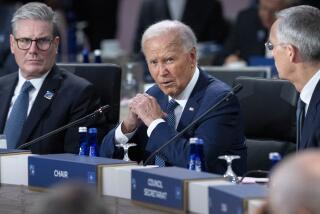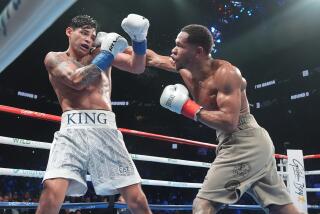3 Doctors Fired From Boxing Program
Three doctors who participated in, then criticized, neurological testing of California boxers have been dropped from the program.
Ken Gray, the California State Athletic Commission’s executive officer, said that the contracts of Dr. Laurence Carnay of Paramount, his partner, Dr. Dale DiSteffano, and Los Angeles neurologist Dr. Clark Espy had not been renewed.
Gray denied, however, that their criticism led to their being fired. He also said that the program has been improved and that better qualified neurologists have been hired to replace the three who were dismissed.
“We didn’t (choose not to) renew their contracts because of their criticisms, it was simply a case of our hiring more qualified people,” Gray said.
In a story in The Times last July 20, the three doctors were quoted as saying that the tests were not thorough enough and that boxers with serious boxing-related brain injuries could still be passing the examinations.
State law requires professional boxers in California to have yearly neurological exams, consisting of written and oral tests and personal evaluations by the neurologists contracted to administer them.
After the testing program’s first year--it began in July 1986--only 8 of 656 boxers had flunked the tests, a result that troubled Carnay, DiSteffano and Espy.
“It’s very chilling to me that you can be penalized like this for speaking out and trying to constructively criticize something,” Carnay said.
“We examined 346 boxers last year, and at no time did anyone from the commission contact us to tell us we were doing a poor job. But when that article came out . . . they didn’t like that.
“This is a state commission. . . . Is this in the best interests of the state of California? Or is it petty antagonism and an overreaction on their part for being informed that they weren’t adequately supervising the testing program?”
Gray admitted to having been angered by the doctors’ comments. “We didn’t like their comments,” he said. “We felt if they had some constructive comments to make about the tests, they should have come directly to us before letting the press know,” he said.
Gray said, however, that the tests have been toughened, and Dr. Fred Flynn, a UCLA neurologist who is a commission consultant, said that they should detect more boxers who ought not be getting into the ring.
“Last year’s tests allowed for too much liberal interpretation on the part of the neurologists as to who fails and who passes,” Flynn said. “The new tests set down hard, fast criteria. It’s now defined who passes and who fails. And there’s no question that more will fail this year, but by what percentage, I don’t know.
“In looking at the first year’s testing, we feel a lot of boxers were passed who had (boxing-related) ostensible neurological damage,” he said.
Espy’s criticism of the first-year test was that it was weighted in favor of the written portion of the exam.
“The commission wants some kind of perfect written exam, and I’ve told them it’s just not possible,” he said. “You’ll always need (to rely heavily on) an evaluation by a neurologist or neurosurgeon. The written part should be part of the entire evaluation process, but it can never be the only element.
“Remember, most boxers come from poor socio-economic backgrounds. Many don’t even speak English. So as a group, they won’t be good test-takers to begin with, even if they weren’t boxers.
“Every criticism I had of the tests was meant to be constructive. But for speaking out . . . for simply suggesting the tests be improved, I got the ax.”
More to Read
Go beyond the scoreboard
Get the latest on L.A.'s teams in the daily Sports Report newsletter.
You may occasionally receive promotional content from the Los Angeles Times.










